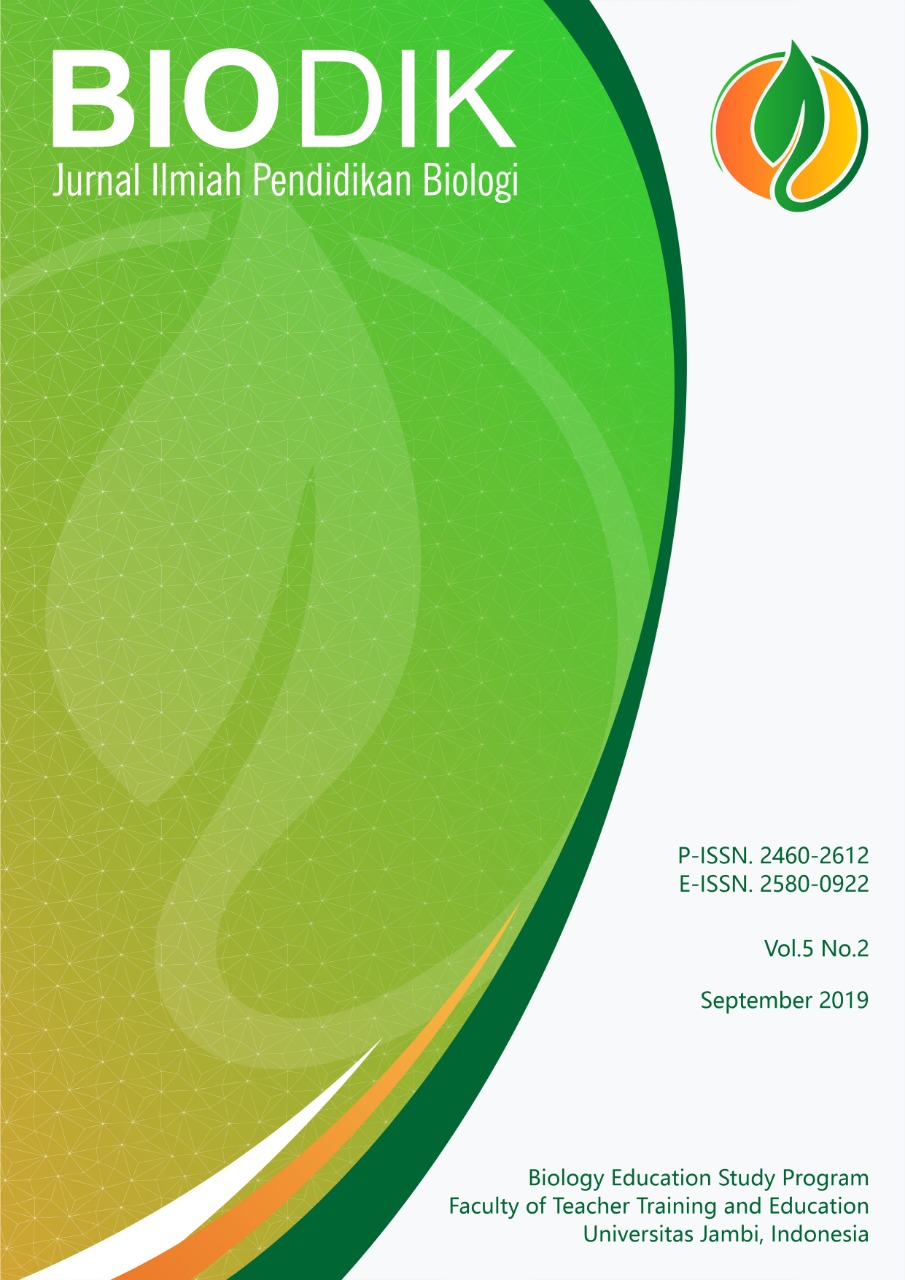Pengembangan Media E-Learning Interaktif Dalam Menyongsong Revolusi Industri 4.0 Pada Materi Ekosistem Untuk Siswa SMA
Interactive Media Development of E-Learning in Welcoming 4.0 Industrial Revolution on Ecosystem Material for High School Students
DOI:
https://doi.org/10.22437/bio.v5i2.7590Abstract
Abstract. Electronic based biology learning media is important to be developed to meet students' needs for the development of the industrial revolution 4.0. The purpose of this research is to produce a product that consists of Web-based interactive e-learning media. The research method uses Research & Development (R&D) with ADDIE models (analysis, Design, Development, Implementation, and Evaluation). Measuring instruments used in this study were questionnaires given to validators and when testing small groups and large groups. In this study using qualitative data analysis from the results of the questionnaire which was then asked quantitatively. The results showed that the media validator and material validator were worth mentioning by the media to be tested. After being tested in small groups, students get a score of 80% (good) and in trials large groups get a score of 80.74% (good). While subject matter teachers gave a score of 80.76% (good). Thus it can be concluded that the responses of students and teachers to interactive e-learning media products based on web ecosystem material are included in the criteria both in accordance with the industrial revolution 4.0. So that students can learn and use interactive e-learning media anywhere and anytime to facilitate learning. For further research it is recommended for other educational materials and levels.
Keywords: Media e-learning, Web, industrial revolution 4.0, Ecosystem
Abstrak. Media pembelajaran biologi berbasis elektronik penting dikembangkan untuk memenuhi kebutuhan siswa seiring perkembangan revolusi industri 4.0. Tujuan penelitian ini adalah menghasilkan produk berupa media e-learning interaktif berbasis Web. Metode penelitian menggunakan Research & Development (R&D) dengan model ADDIE (analysis, Design, Development, Implementation, dan Evaluation). Alat ukur yang digunakan dalam riset ini adalah kuesioner yang diberikan kepada validator dan saat uji kelompok kecil dan kelompok besar. Dalam penelitian ini menggunakan analisis data kualitatif dari hasil kuesioner lalu ditafsirkan secara kuantitatif. Hasil penelitian menunjukkan bahwa validator media dan validator materi menyatakan layak media ini untuk diujicobakan. Setelah diujicoba pada kelompok kecil pada siswa mendapatkan skor 80% (baik) dan pada uji coba kelompok besar mendapat skor 80,74% (baik). Sementara guru bidang studi memberikan skor 80,76% (baik). Dengan demikian dapat disimpulkan bahwa respon siswa dan guru terhadap produk media e-learning interaktif berbasis web pada materi ekosistem termasuk dalam kriteria baik sesuai dengan revolusi industri 4.0. Peneliti menyarankan agar siswa dan menggunakan media e-learning interaktif dimana dan kapan saja untuk memudahkan belajar. Untuk penelitian selanjutnnya disarankan untuk materi dan jenjang pendidikan yang lain .
Kata Kunci : Media e-learning, Web, revolusi industri 4.0, Ekosistem
Downloads
Downloads
Published
Versions
- 2019-09-02 (1)
- 2019-09-02 (1)
How to Cite
Issue
Section
License
Copyright Notice
Authors who publish with Biodik : Jurnal Ilmiah Pendidikan Biologi agree to the following terms:
- For all articles published in Biodik : Jurnal Ilmiah Pendidikan Biologi, copyright is retained by the authors and grant the journal right of first publication with the work simultaneously licensed under a Creative Commons Attribution-ShareAlike 4.0 International Licensethat allows others to share the work with an acknowledgment of the work's authorship and initial publication in this journal.
- Authors are able to enter into separate, additional contractual arrangements for the non-exclusive distribution of the journal's published version of the work (e.g., post it to an institutional repository or publish it in a book), with an acknowledgment of its initial publication in this journal.
- Authors are permitted and encouraged to post their work online (e.g., in institutional repositories or on their website) prior to and during the submission process, as it can lead to productive exchanges, as well as earlier and greater citation of published work (See The Effect of Open Access).
















